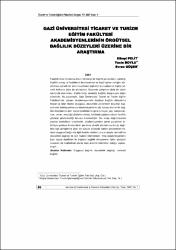Gazi Üniversitesi Ticaret ve Turizm Eğitim Fakültesi Akademisyenlerinin Örgütsel Bağlılık Düzeyleri Üzerine Bir Arastırma
Abstract
Faaliyet alanı ne olursa olsun, herhangi bir örgütte çalısanların, çalıstıgı örgütün amaç ve hedeflerini benimsemesi ve örgüt içinde varlıgını sürdürmeye yönelik bir arzu hissetmesi süphesiz ki o çalısanın örgüte yönelik katkısını daha da artıracaktır. Esasında çalısanın böyle bir tutum içerisinde bulunması, örgüte karsı besledigi baglılık duygusuyla dogru orantılıdır. Bu çalısmada, Gazi Üniversitesi Ticaret ve Turizm Egitim Fakültesi’nde çalısan akademisyenlerin örgütsel baglılık düzeylerini Meyer ve Allen Modeli (duygusal, devamlılık ve normatif boyutlar) kapsamında belirleyebilme ve akademisyenlerin söz konusu bu her bir baglılık düzeylerinin bazı kisisel özelliklerine göre (cinsiyet, yas, medeni durum, unvan, meslegi sürdürme süresi, fakültede çalısma süresi) farklılık gösterip göstermedigi konusu incelenmistir. Bu amaç dogrultusunda yapılan istatistiksel analizlerde, akademisyenlerin gerek çalıstıkları fakülteye gerekse üniversitenin geneline yönelik söz konusu bu üç baglılıkla ilgili görüslerine göre, en yüksek düzeyde katılım gösterdikleri ifadeler duygusal baglılıkla ilgili ifadeler olurken; onu sırasıyla normatif ve devamlılık baglılıgı ile ilgili ifadeler izlemektedir. Yine akademisyenlerin bazı kisisel özellikleri ile örgütsel baglılık düzeylerine iliskin görüsleri arasında da istatistiksel olarak bazı anlamlı farklılıklar oldugu saptanmıstır. The approval of the purpose and targets of the organization by the worker and the will of continuing to be the part of the organization will promote the worker& #8217; s contribution to the organization whatever the subject area is. In fact the workers& #8217; behavior is in direct proportion with the loyalty feelings of the worker to the organization. In this study organizational commitment level of the academicians (affective, continuance and normative perceptions) and whether these commitment levels are changing according to some personal qualities (gender, age, marital status, academic title, time of pursuing the vocation, working time in the faculty) has been measured by using Meyer and Allen models. Within this concept statistically it has been found that academicians are mostly approving the expressions concerning emotional commitment both to their faculty in which they work and to their university in general. Expressions concerning commitment in normative perceptions and continuity are following expressions of emotional commitment. It has also been understood that there is statistical differences between academicians& #8217; certain personal qualities and the opinions of the academicians& #8217; organizational commitment.


















